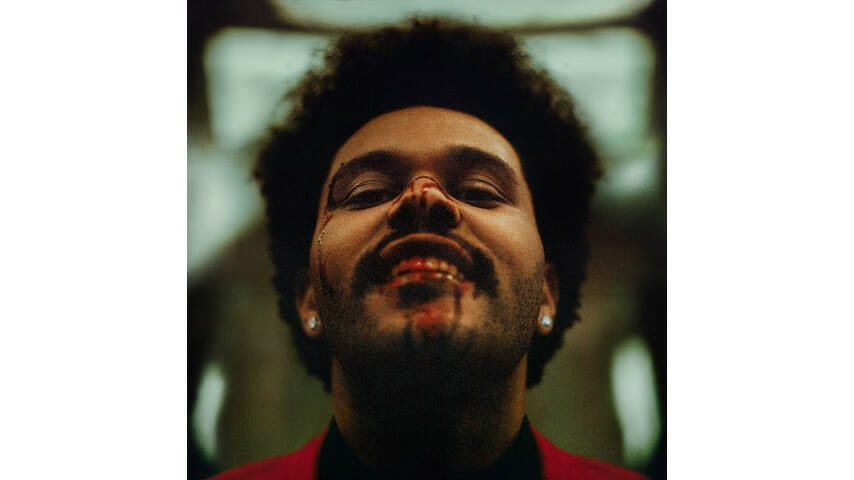At the End of the World, The Weeknd Finds Himself in After Hours
Abel Tesfaye has made his most appealing record in years
Music Reviews The Weeknd
Nearly a decade into singing the same horny, drugged up blues, The Weeknd seems bored of his own shtick.
After Hours is The Weeknd’s first full-length record since 2016—barring the anomalous six-track 2018 mini-album My Dear Melancholy—and it’s an album of absurdly monolithic proportions, a solipsistic character study of crocodile tears and bored sex aligned with one of the worst global crises in human history. For all his calls to unite around his music in the face of a pandemic, Abel Tesfaye can’t quite sell this record as anything but an indulgent and grandiose showcase of excess divorced from reality.
And yet, by peeling back his persona just a little bit to reveal a little more self-awareness and a lot more camp, The Weeknd has made his most appealing record in years—a reminder of just how good Tesfaye is at this whole elite pop stardom thing.
Borrowing from the impenetrable largesse of Johnny Jewel’s Italians Do it Better label, the legacy of cinematic and musical Lotharios from decades past and his role in the Safdie brothers’ Uncut Gems, After Hours straddles the line between the ambition of the man who introduced himself via a triptych suite and the casual brilliance of his Diamond-selling singles. A loose concept encircles the album—Vegas, the ’80s, a lot of blood and repentance—but the self-seriousness of the rollout, replete with on-theme Saturday Night Live performances and a short film, belies the sense that Tesfaye’s in on the whole bit. The otherwise peak-Weeknd malaised “Snowchild” features a couplet that will be coronated as the wildest lyric Tesfaye has ever sung: “She like my futuristic sounds in the new spaceship / Futuristic sex, give her Philip K. Dick.” Throughout the album, he likens himself in his sweet and vicious croon to disappeared union mobster Jimmy Hoffa, Patrick Swayze—those first two also in “Snowchild”—Jay-Z and Keanu Reeves, for good measure.
There’s something bold about naming two of the album’s better tracks after arguably the two singles most indelibly tied into the era that he’s trying to mimic—neither of which are covers. As if to escape the long shadow of Michael Jackson comparisons hovering over his career, he chose to immerse himself in ’80s broadly. Both are very good, too: “Faith” turns George Michael’s bedroom-as-church giddiness into its hedonistic, faithless antithesis, while “In Your Eyes” may just be the most kitschy thing The Weeknd has ever done, replete with a sax solo fresh out of 1987.
The Weeknd’s most notable collaborators here are the two Kevins: Lopatin of Oneohtrix Point Never and Parker, whose louche, top-button-unbuttoned brand of pop on Tame Impala’s latest fits in very nicely with a good portion of After Hours’ studio sounds. Both team up on “Repeat After Me (Interlude),” a mantra that feels desolate—almost as if he’s trying to manifest an ex back into his life by scrolling through her feeds. It’s a shame that he reserves his most interesting moments for interludes, much as he did for the Lana Del Rey-featuring “Stargirl” on 2016’s Starboy.
Still, even the exercises in straightforward modern pop are stunning, accompanied with tinges of electronic experimentation: The Max Martin-helmed “Hardest to Love” is a drum and bass apology to a partner whose commitment remains unwavering even as he self-destructs in fits and starts. Same goes for “Too Late,” which rides a two-step beat via OG collaborator Illangelo into a sort-of Bonnie and Clyde escape into futility.
A stretch of After Hours where his repentance and misery turns drab and gross—the “Your Song”-cribbing “Scared to Live,” with gated drums and an Elton John co-sign aiming for the anthemic—feigns sincerity but lands somewhere in between coked-out revelations and a pious rant from your most sinful friend. “Escape from LA” borrows from the same groundswell of songs about hating Los Angeles, from Randy Newman to The Magnetic Fields to Charlie Puth, but this time he adds the sexist footnote that all L.A. girls got the same work done.
Part of the appeal of The Weeknd, in spite of the off timing, is his commitment to his bit as the louche, charming misanthrope. Truly great pop is escapist, a chance to transform the otherwise mundane into something divine for a three-minute time span. Tesfaye doesn’t always get it right, but on After Hours, he offers up at least a few moments of communion during a time of isolation.